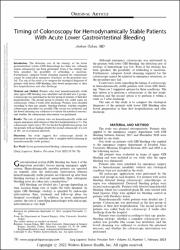Timing of Colonoscopy for Hemodynamically Stable Patients With Acute Lower Gastrointestinal Bleeding
Künye
Özkan A. (2023). Timing of Colonoscopy for Hemodynamically Stable Patients With Acute Lower Gastrointestinal Bleeding. Surgical laparoscopy, endoscopy & percutaneous techniques, 33(1), 76–78. https://doi.org/10.1097/SLE.0000000000001133Özet
Acil kolonoskopi yapılmasına rağmen alt gastrointestinal sistem (GİS) kanamalarının etyolojisini tespit etme oranı düşüktür. Etiyoloji belirlenmiş olsa bile tekrar kanama olasılığı belirsizdir. Ayrıca acil durumlarda kolonoskopi için gerekli bağırsak temizliği sağlanamadığı için işlem başarısızlıkla sonuçlanabilmektedir. Bu çalışmanın amacı alt GİS kanaması olan hastaların barsak hazırlığı sonrası hastaneye ilk yatışları ve taburculuk sonrası etiyolojik tanılarını karşılaştırmaktır.
Üst GİS kanaması sonrası hemodinamik olarak stabil olan hastalar belirlenerek 2 gruba ayrıldı. Birinci gruptaki hastalara ilk yatışlarında kolonoskopi yapıldı. İkinci gruptaki hastalar taburcu olduktan 2 hafta sonra tekrar kolonoskopiye çağrıldı. Hastalar yaş, cinsiyet, kanama etiyolojisi, tam kolonoskopi işleminin mümkün olup olmadığı (çekum entübe edildi ve bağırsak temizliği bağırsak mukozasını değerlendirmek için yeterliydi), kolonoskopik girişim yapılıp yapılmadığına göre sınıflandırıldı.
Hastaneye ilk yatışlarında hemodinamik olarak stabil olan ve acil müdahale gerektiren hastaların oranı %5'tir. İlk yatış grubunda kolonoskopi tekrarlama oranı %70 olup, ikinci kolonoskopiye rağmen %50 oranında bulgusu olmayan hastalar elektif olarak tekrar değerlendirilmektedir.
Çalışmamız hemodinamik olarak stabil hastalarda kolonoskopinin tam bağırsak temizliği sonrasında elektif koşullarda yapılması gerektiğini düşündürmektedir. The detection rate of the etiology of the lower gastrointestinal system (GIS) hemorrhage has been low, although urgent colonoscopy has been performed. Even if the etiology has been specified, the possibility of rebleeding is uncertain. Furthermore, adequate bowel cleansing required for colonoscopy cannot be achieved in emergency situations, so the procedure may fail. The aim of this study is to compare the etiological diagnoses of patients with lower GIS bleeding after bowel preparation at their first hospitalization and after discharge.
Patients who were hemodynamically stable after upper GIS bleeding were identified and divided into 2 groups. Colonoscopy was performed in the first group of patients at their first hospitalization. The second group of patients was called again for colonoscopy within 2 weeks after discharge. Patients were classified according to their age, gender, bleeding etiology, whether complete colonoscopy procedure was possible (The cecum was intubated, and the bowel cleansing was sufficient to evaluate the intestinal mucosa), and whether the colonoscopic intervention was performed.
The rate of patients who are hemodynamically stable and require emergency intervention at their first hospitalization is 5%. The colonoscopy repeat rate is 70% for the first hospitalization group, and the patients with no findings despite the second colonoscopy at a rate of 50% are re-evaluated electively.
Our study suggests that colonoscopy should be performed in elective conditions after a complete bowel cleansing in hemodynamically stable patients.

















